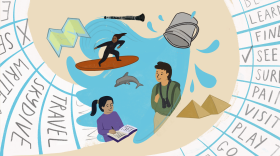
Melody Bodette
Contributing Editor, But WhyMelody is the Contributing Editor for But Why: A Podcast For Curious Kids and the co-author of two But Why books with Jane Lindholm.
She was formerly Vermont Public's deputy news director, Morning Edition producer, and a reporter covering Addison and Franklin counties.
-
Why did the dinosaurs go extinct? Many of you have learned about the meteorite that scientists say hit the earth 66 million years ago and killed off many dinosaur species. But some dinosaurs survived, and the birds you see flying around today are their direct descendants! In this episode we trace the connection between modern birds and prehistoric dinosaurs. Other questions include:Were any dinosaurs mammals?How did bird dinosaurs survive?Are crocodiles related to dinosaurs?Did dinosaurs have feathers? How do we know?Did all dinosaurs lay eggs?Our guest is Dr. Emily Bamforth, curator of the Philip J. Currie Dinosaur Museum in Alberta, Canada.
-
Why are brothers and sisters so annoying? Why do siblings often look a lot alike? Why do siblings fight? Can your sister be your best friend? Why do we fight with our siblings even if we love them? But Why takes a look at the sibling relationship with Susan Dominus, author of The Family Dynamic.
-
Have you ever heard of a bucket list? That’s an expression people sometimes use that means something big you want to do or see or accomplish in your lifetime! For our last episode every year, we like to turn things around and WE ask a question for YOU to answer! Our 2025 end-of-year question is for you to tell us what’s on your bucket list–what’s something really big that you hope to accomplish at some point in your lifetime? Listen to this episode for things to add to your bucket list!
-
How do musical instruments make their sounds? Why do people play music in the first place? What’s a viola bow made out of? How are musical instruments made? How much do professional musicians practice? Three musicians from the Vermont Symphony Orchestra joined families at the Vermont Public Studios for a special live episode during our Curious Kids Day live events. We hear from Melissa Meilens on flute, Katie Oprea on oboe and Stefanie Taylor on viola.
-
The Macy’s Thanksgiving Day Parade is an American tradition. It’s been going since 1924. This year marks the 99th parade (it took three years off during World War II). It’s famous for elaborate floats and huge character balloons that bob above the streets as the parade marches forward. Millions of people watch the parade live in New York City each year, but many many more watch it on TV. And some of you have questions! How do they make such big balloons for the parade and how do they choose which characters to feature? And how do they hold onto the balloons with such tiny strings? And, more generally, how do balloons float? What’s helium got to do with it? But Why visits the Macy’s Studio workshop in New Jersey to see how the magic happens!
-
Who invented candy? Why is it so sweet? Why does hard candy melt in your mouth? How are candy corn, gummies and nerds made? What makes pop rocks pop? We talk with traditional candy makers at Sticky in California and Hercules Candies in New York about how these sweet treats take their shape. And we get a little reminder about why we can’t eat sugar all day, every day.
-
But Why went somewhere really cool - literally - and we’re taking you along! We visited Sólheimajökull, a glacier in southern Iceland and then talked with University of Iceland glaciologist Guðfinna Aðalgeirsdóttir to discover how glaciers are formed, why they can be different colors, and how they shape the land. (Do you know the difference between a V-shaped valley and a U-shaped valley? Glaciers!) Plus we’ll talk a little bit about why glaciers around the world are retreating at such a fast pace.
-
For today’s episode, we’re doing something a little different! We’re going to be listening to our video series, But Why Bites! (Even without the video part, they’re really cool!) Every other week over on our YouTube channel, we answer one kid question in a short and sweet little video. You can find all of them at the But Why Kids channel while you enjoy this compilation of episodes that we’re calling a Big Bite.
-
Ever wondered why some spices burn your throat while others tickle your nose? Or why some of us live for spicy foods while others sweat at the mere thought of a habanero? How do pickles stay crunchy if they’re sitting in brine for weeks on end? And why do we have such different food preferences from our friends? We’re answering your food questions with chef and author Kenji López-Alt, author of the kids book Every Night is Pizza Night and co-host of The Recipe.
-
How did horseshoe crabs get their names? Are they even crabs? And did they really exist before the dinosaurs? Early spring presents a unique opportunity to see these living fossils up close as they scuttle up to the shoreline along the Atlantic coast of the United States to mate and spawn. But Why traveled to Cape Cod to see horseshoe crabs up close. There we met up with horseshoe crab expert Sara Grady, who works for Mass Audubon. We learn all about these arthropods and answer questions like: Can humans eat horseshoe crabs? What’s with the pointy tails? Do they pinch? How long do they live? And what’s so special about their blood?










